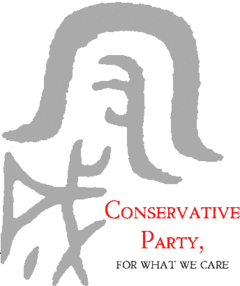Conservative Party (Themiclesia)
Conservative Party 守成黨 (sn′ju′-djeng-dang′) | |
|---|---|
 Logo adopted in 1967 | |
| Abbreviation | TCP ("The Conservative Party") |
| Founded | 1857 |
| Split from | Grand Alliance (1835 – 1857) |
| Preceded by | Fiscal conservatives (1797 – 1835) |
| Newspaper | Demesne Post (縣報, gwênh-kwal-puh) |
| Student wing | Alliance of Socialist Students |
| Youth wing | Guardians Society |
| Women's wing | Association of Conservative Women |
| Ideology | democratic socialism paternalistic conservatism classical conservativsm (pre-1850) |
| Political position | Centre-left |
| International affiliation | Progressive Alliance |
| Slogan | For What We Care |
| Commons | 72 / 212
|
| Lords | 129 / 231
|
The Conservative Party is a left-wing political party in Themiclesia active on the national level. The party was founded formally in the mid-1800s as a reaction against the tightly-organized and dominant Liberal Party. It historically consisted of several factions united less for ideological harmony than political convenience, but since the early 1900s they have settled into its current political position as the primary left-wing party in Themiclesia.
History
Fiscal conservatives (1795 – 1845)
Reactionary conservatism (1845 – 1872)
New Conservatism (1872 – 1900)
New Conservatism is a philosophy championed by a series of proactive Conservative leaders challenging the traditional, reactionary form of conservatism supported by the landed aristocracy, mostly represented through the House of Lords. The Liberal Party in the 1850s and 60s sought to introduce public education, military reforms, poor relief through workhouses, and other business-friendly policies, defrayed by a progressive land tax raised on aristocratic estates, which was vetoed by the House of Lords. This led to deadlock with the House of Commons and heightened social tensions, which the Liberals encouraged to pressure the Lords into passing bills. Younger Conservative peers hoped to defeat the Liberals and their "reckless politics" in the House of Commons itself, rather than resorting to the veto, which is known to inflame public anger and benefit the Liberals. This would be achieved by repositioning the Conservative Party as a reformer, introducing policies that appeased the disenfranchised working class, at the expense of the Liberal industrial and commercial class.
The Conservative Party formally adopted the New Policy in 1872, though this had been argued for since the mid-1860s, especially by the Lord of Tek-lang. In his speech in 1867, he deplored the reaction of the aristocracy, which he claimed owed "an moral debt of justice to the common people, who exalted us by their vileness and enriched us by their indigence. This ghastly debt we now must paid, or one day be made to pay", referring plainly to the results of violent revolutions in Casaterra. Tek-lang's appeal is compared to the Casaterran doctrine of noblesse oblige, where the nobility justified their privilege on the assumption that they somehow assisted the common people; this represents a major departure from the reactionary paradigm, which either ignored the question of social justice or rejected the question completely, believing it was the natural right for the aristocracy to exploit the lower classes.